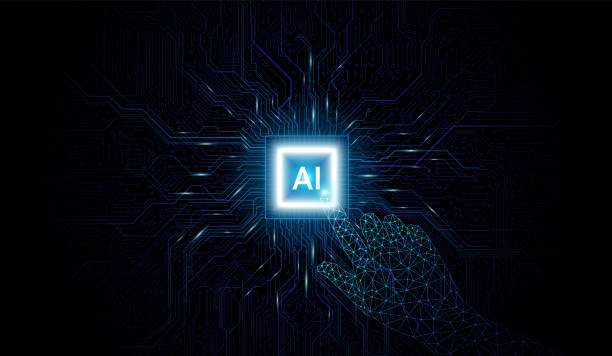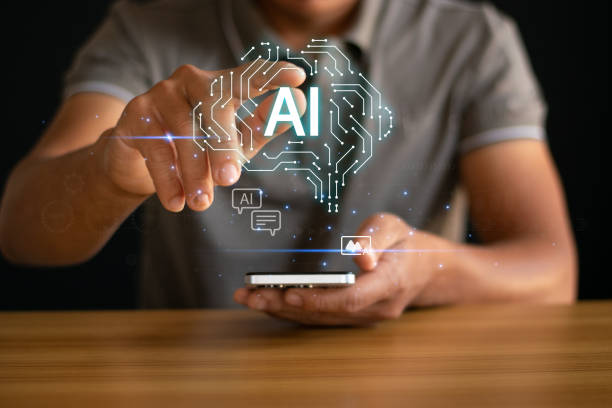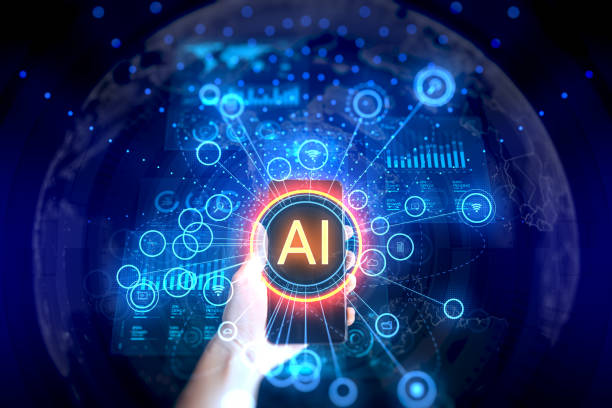### What is Artificial Intelligence and What are its Applications?

#Artificial_Intelligence (Artificial Intelligence) or #AI, is a branch of computer science that seeks to build machines and systems capable of performing tasks that usually require human intelligence.
These tasks include learning, reasoning, problem-solving, natural language understanding, pattern recognition, and decision-making.
In other words, artificial intelligence tries to enable computers to think and act like humans.
The applications of artificial intelligence are very broad and diverse, and have affected almost all industries and aspects of life.
Below are some of the most important applications of artificial intelligence:
- Healthcare: Artificial intelligence plays an important role in diagnosing diseases, developing drugs, robotic surgery, and managing healthcare.
- Industry: In manufacturing, artificial intelligence is used for process automation, quality control, predicting machine breakdowns, and optimizing the supply chain.
- Finance: Artificial intelligence is used in fraud detection, risk management, algorithmic trading, and providing personalized financial advice.
- Transportation: Self-driving cars, traffic management systems, and route optimization are among the applications of artificial intelligence in this field.
- Education: Artificial intelligence can provide personalized educational systems, automated task evaluation, and feedback to students.
- Customer service: AI-based chatbots and virtual assistants provide 24-hour service to customers and answer their questions.
The main goal of artificial intelligence is to create systems that can perform complex tasks with high accuracy and efficiency and help humans in doing tasks.
The development of artificial intelligence continues and is expected to play a much more important role in our lives in the future.
Are you tired of your online store having visitors but no sales? Rasaweb solves your main problem by designing professional online stores!
✅ Significant increase in sales with targeted design
✅ Flawless user experience for your customers
⚡ Get a free consultation!
Types of Artificial Intelligence in terms of Ability and Performance

Artificial intelligence can be divided into several main categories based on ability and performance.
This classification helps us to have a better understanding of the capabilities and limitations of different types of artificial intelligence systems.
- Narrow or Weak AI: This type of artificial intelligence is only capable of performing one specific task well.
Most of today’s artificial intelligence systems fall into this category.
For example, a face recognition system or a customer service chatbot. - General or Strong AI: This type of artificial intelligence has cognitive abilities similar to humans and can perform any task that a human is capable of doing.
General artificial intelligence is still under development and has not been fully realized. - Super AI: This type of artificial intelligence surpasses human intelligence and is able to perform better than humans in all fields.
Super artificial intelligence is still a theoretical concept and does not exist.
Also, artificial intelligence can be divided into the following categories based on how it works:
- Rule-based systems: These systems use a set of predefined rules to make decisions.
- Machine learning systems: These systems learn using data and are able to improve their performance over time.
- Deep learning systems: These systems use deep neural networks to learn complex patterns in data.
Choosing the right type of artificial intelligence depends on the specific needs and goals of the project.
Limited artificial intelligence is suitable for specific and defined tasks, while general and super artificial intelligence have more ambitious goals and are still in the early stages of development.
Artificial intelligence is a powerful tool.
Machine Learning and its Role in the Development of Artificial Intelligence

#Machine_Learning is one of the main sub-branches of artificial intelligence that allows systems to learn from data and improve their performance without explicit programming.
In other words, machine learning gives computers the ability to identify patterns and relationships in data by analyzing it and use these patterns to predict or make decisions.
Machine learning plays a very important role in the development of artificial intelligence.
Many of today’s advanced artificial intelligence systems use machine learning algorithms to perform complex tasks.
For example, face recognition systems, speech recognition, machine translation, and self-driving cars all benefit from machine learning.
There are different types of machine learning algorithms, each of which is suitable for a specific type of data and task.
Some of the most important types of machine learning include:
- Supervised learning: In this type of learning, the system is trained using labeled data.
Labeled data includes inputs and expected outputs. - Unsupervised learning: In this type of learning, the system is trained using unlabeled data.
The goal here is to discover hidden patterns and structures in the data. - Reinforcement learning: In this type of learning, the system learns how to act in a specific environment to achieve the desired goal by trial and error and receiving rewards or penalties.
| Machine Learning Algorithm | Application |
|---|---|
| Linear Regression | Predicting Housing Prices |
| Decision Tree | Disease Diagnosis |
| Neural Networks | Image Recognition |
Machine learning, as one of the most important factors in the advancement of artificial intelligence, enables systems to make smarter decisions and improve their performance by analyzing data and identifying patterns.
Artificial intelligence is advancing rapidly and machine learning plays a key role in this advancement.
Deep Learning and Neural Networks

#Deep_Learning is one of the most advanced branches of machine learning that uses deep neural networks to learn complex patterns in data.
Deep neural networks consist of several interconnected layers, each layer being responsible for extracting specific features from the data.
This layered structure allows deep neural networks to identify very complex and non-linear patterns in data.
Neural networks consist of artificial neurons that are interconnected and transfer information from one layer to another.
Each neuron receives inputs, processes them, and produces an output.
Weights and biases in neural networks play an important role in determining how information is processed.
Deep learning has achieved very good results in many fields.
Some of the most important applications of deep learning include:
- Image Recognition: Deep neural networks have been very successful in recognizing images and identifying objects in images.
- Speech Recognition: Deep learning has helped to improve the accuracy and efficiency of speech recognition systems.
- Natural Language Processing: Deep neural networks are used in machine translation, text summarization, and sentiment analysis.
- Computer Games: Deep learning has played an important role in the development of artificial intelligence for computer games, such as AlphaGo.
The main advantage of deep learning is that it reduces the need for manual feature engineering.
In traditional machine learning methods, engineers have to manually extract features related to the problem.
But in deep learning, deep neural networks are able to learn related features automatically from data.
This makes deep learning very suitable for complex problems with voluminous data.
However, deep learning requires a lot of data and high processing power.
Artificial intelligence deep learning is very suitable for complex problems.
Is your online store ready to maximize customer attraction and increase sales? Rasaweb transforms your online business with modern and efficient online store designs.
✅ Increased speed and improved SEO
✅ Excellent user experience on mobile and desktop⚡ Get a free online store design consultation from Rasaweb!
Natural Language Processing (NLP) and Understanding the Meaning of Text

#Natural_Language_Processing or #NLP, is a branch of artificial intelligence that gives computers the ability to understand and process human language.
The main goal of NLP is to create systems that can analyze texts and speech, extract their meanings, and answer questions related to them.
Natural language processing includes a set of techniques and algorithms that are used to perform various tasks such as machine translation, sentiment analysis, text summarization, named entity recognition, and answering questions.
For example, machine translation systems like Google Translate use NLP to translate texts from one language to another.
Sentiment analysis systems use NLP to detect emotions in texts, such as customer opinions about a product or service.
One of the most important challenges of NLP is understanding the meaning of text.
Human language is very complex and ambiguous.
A sentence can have different meanings depending on the context and how it is expressed.
NLP tries to resolve these ambiguities and understand the real meaning of the text.
Deep learning algorithms, especially Recurrent Neural Networks and Transformers, have played a very important role in the advancement of NLP.
These algorithms are able to learn complex patterns in language and allow systems to process texts with greater accuracy.
Artificial intelligence is developing and NLP plays an important role.
The applications of NLP are very broad and have affected almost all industries that deal with textual data.
Some of the most important applications of NLP include:
- Chatbots and Virtual Assistants: NLP allows chatbots and virtual assistants to communicate with users in natural language.
- Search Engines: NLP allows search engines to better understand user questions and provide more relevant results.
- Social Media Analysis: NLP allows companies to analyze user opinions and feelings in social media and use this information to improve their products and services.
- Medicine: NLP allows doctors to automatically extract medical information and use this information to diagnose and treat diseases.
Ethics and Challenges of Artificial Intelligence

The development of artificial intelligence is accompanied by several challenges and ethical issues that must be addressed.
One of the most important of these challenges is the issue of #Bias_in_Artificial_Intelligence.
Artificial intelligence algorithms are trained using data, and if the training data is biased, the algorithm will also act in a biased manner.
For example, if a face recognition system is trained using data that mostly includes images of white people, it may have less accuracy in recognizing the faces of non-white people.
Another issue is #Privacy.
Many artificial intelligence systems need users’ personal data to function.
Collecting and using this data can violate users’ privacy.
Therefore, laws and regulations must be put in place to protect users’ privacy from misuse of their data.
#Accountability is also another important challenge of artificial intelligence.
If an artificial intelligence system makes a mistake, who will be responsible? Is the system developer, the user, or the system itself responsible? These questions do not yet have definitive answers and require further discussion and review.
In addition, the issue of #Employment is also raised.
With the advancement of artificial intelligence, many jobs may be automated and this can lead to widespread unemployment.
Therefore, we must think about creating new job opportunities and training the necessary skills to work in the world of artificial intelligence.
The ethical issues of artificial intelligence are very complex and multifaceted and require cooperation between artificial intelligence experts, policymakers, lawyers, and civil society.
We must try to develop artificial intelligence in a way that benefits all members of society and prevents harming them.
Artificial intelligence must be developed ethically.
The Future of Artificial Intelligence and its Impact on Our Lives

The future of #Artificial_Intelligence is very bright and full of potential.
It is expected that in the coming years, artificial intelligence will play a much more important role in our lives and affect almost all aspects of life.
Below are some of the most important possible impacts of artificial intelligence on our lives:
- Healthcare: Artificial intelligence can help improve disease diagnosis, develop drugs, and provide personalized healthcare.
- Education: Artificial intelligence can provide personalized educational systems, automated task evaluation, and feedback to students.
- Transportation: Self-driving cars can reduce traffic, increase road safety, and help people with disabilities.
- Industry: Artificial intelligence can help automate processes, improve product quality, and increase productivity.
- Customer Service: AI-based chatbots and virtual assistants can provide 24-hour service to customers and answer their questions.
| Area | Impact of Artificial Intelligence |
|---|---|
| Health | Faster and more accurate disease diagnosis |
| Education | Personalized learning |
| Transportation | Self-driving cars and reduced accidents |
However, the development of artificial intelligence requires attention to ethical and social issues.
We must strive to develop artificial intelligence in a way that benefits all members of society and prevents harm to them.
Artificial intelligence has a bright future.
The Role of Governments and Policymaking in the Field of Artificial Intelligence

Governments play a very important role in the development and regulation of #Artificial_Intelligence.
They can help the development of artificial intelligence by investing in artificial intelligence research and development, creating the necessary infrastructure, developing appropriate laws and regulations, and training a specialized workforce.
One of the most important tasks of governments is to develop ethical policies for artificial intelligence.
These policies should address important issues such as bias, privacy, accountability, and transparency in artificial intelligence.
The goal of these policies should be to develop artificial intelligence in a way that benefits all members of society and prevents harming them.
Governments can also help startups and startups in the field of artificial intelligence by creating venture capital funds.
This can help accelerate innovation and development of new artificial intelligence technologies.
Training a specialized workforce is also another important task of governments.
Appropriate training programs should be created to teach the necessary skills to work in the world of artificial intelligence.
These programs should include training in machine learning algorithms, natural language processing, computer vision, and other areas related to artificial intelligence.
Governments can also help improve the quality and reliability of artificial intelligence systems by creating technical standards for artificial intelligence.
These standards should address important issues such as security, interoperability, and maintainability.
Artificial intelligence requires correct policymaking.
Are you lagging behind in competition with large online stores?
Rasaweb professional online store design will bring your business online and increase your market share!
✅ Increase brand credibility and customer trust
✅ Easy shopping experience leads to more sales
⚡ Act now to get a free website design consultation!
How to Learn Artificial Intelligence? Educational Resources and Learning Paths

Learning #Artificial_Intelligence can be an exciting and challenging journey.
Fortunately, many educational resources are available that can help you on this path.
Below are some of the most important educational resources and learning paths for artificial intelligence:
- Online Courses: Sites such as Coursera, edX, Udacity, and Udemy offer a variety of online courses in the field of artificial intelligence.
These courses are usually taught by professors from reputable universities and include videos, exercises, and practical projects. - Books: There are many books on artificial intelligence that can help you understand basic and advanced concepts.
Some of the famous books in this field include “Artificial Intelligence A Modern Approach” by Stuart Russell and Peter Norvig and “Deep Learning” by Ian Goodfellow, Yoshua Bengio, and Aaron Courville. - Scientific Articles: Reading scientific articles published in reputable conferences and journals can help you understand the latest advances in artificial intelligence.
- Practical Projects: Doing practical projects can help you strengthen your skills in the field of artificial intelligence.
You can define your own personal projects or participate in open source projects. - Online Communities: Joining online communities can help you connect with other artificial intelligence enthusiasts.
You can ask your questions in these communities and use the experiences of others.
Artificial intelligence learning paths can vary depending on your goals and level of knowledge.
If you are a beginner, you can start by learning the basic concepts of artificial intelligence, machine learning, and deep learning.
Then you can study different machine learning algorithms and neural networks.
Finally, you can do practical projects and study scientific articles.
Artificial intelligence can be learned through various resources.
Artificial Intelligence Development Tools

To develop #Artificial_Intelligence, you need the right tools that facilitate the process of designing, implementing, and evaluating models.
Below are some of the most important tools for artificial intelligence development:
- Programming Languages: Python is known as the main language for artificial intelligence development.
Other languages such as R, Java, and C++ are also used for artificial intelligence development. - Machine Learning Libraries: Libraries such as TensorFlow, PyTorch, scikit-learn, and Keras provide powerful tools for building and training machine learning and deep learning models.
- Integrated Development Environments (IDEs): Development environments such as Jupyter Notebook, PyCharm, and VS Code are suitable tools for writing, running, and debugging artificial intelligence code.
- Cloud Platforms: Cloud platforms such as Google Cloud AI Platform, Amazon SageMaker, and Microsoft Azure Machine Learning provide powerful tools for developing, deploying, and managing artificial intelligence models at scale.
- Data Visualization Tools: Tools such as Matplotlib, Seaborn, and Plotly are suitable tools for visualizing data and the results of artificial intelligence models.
Choosing the right tool depends on the specific needs and goals of the project.
For small and medium-sized projects, using machine learning libraries and integrated development environments is sufficient.
But for large and complex projects, the use of cloud platforms and data visualization tools is essential.
Artificial intelligence is developed with various tools.
In the end, artificial intelligence development requires knowledge, skills, and experience.
By using the right tools and continuous learning, you can become a successful artificial intelligence developer.
FAQ
| Question | Answer |
|---|---|
| What is Artificial Intelligence? | It is the simulation of human intelligence in programmed machines to think like humans and mimic their actions. |
| What are the main branches of Artificial Intelligence? | They include Machine Learning, Deep Learning, Natural Language Processing, Computer Vision, and Robotics. |
| What is Machine Learning (ML)? | It is a branch of Artificial Intelligence that focuses on enabling systems to learn from data and identify patterns without explicit programming. |
| Give examples of Artificial Intelligence applications in our daily lives. | Voice assistants (such as Siri and Alexa), recommendation systems in Netflix and Amazon, self-driving cars, and facial recognition programs. |
| What is Deep Learning? | It is a subset of Machine Learning that uses multi-layered (deep) artificial neural networks to process large amounts of data. |
| What is Natural Language Processing (NLP)? | It is a branch of Artificial Intelligence that focuses on enabling computers to understand, interpret, and generate human language. |
| What are some of the ethical concerns related to Artificial Intelligence? | They include bias in data, privacy, job loss, and accountability in case of errors. |
| What are the main benefits of Artificial Intelligence? | Increased efficiency, improved decision-making, automation of repetitive tasks, and discovery of complex patterns in data. |
| How is Artificial Intelligence used in the field of Healthcare? | In diagnosing diseases, discovering drugs, analyzing medical images, and personalized patient care. |
| How do you see the future of Artificial Intelligence? | It is expected to continue developing at a rapid pace, affecting all aspects of human life, from industry to education and entertainment. |
And other services of Rasa Web Advertising Agency in the field of advertising
Smart Customer Journey Map: A novel service to enhance digital branding through smart data analysis.
Smart Sales Automation: A creative platform to improve website traffic by managing Google Ads.
Smart Marketplace: An effective tool for analyzing customer behavior with the help of attractive user interface design.
Smart Marketing Automation: A novel service to increase customer acquisition through a SEO-based content strategy.
Smart Advertising Campaign: A quick and efficient solution for analyzing customer behavior with a focus on smart data analysis.
And more than hundreds of other services in the field of internet advertising, advertising consulting, and organizational solutions
Internet Advertising | Advertising Strategy | Advertorial
Resources
What is Artificial Intelligence?
,Artificial Intelligence in Wikipedia
,Artificial Intelligence Basics
, Everything about Artificial Intelligence
? Take your business to the peak with Rasaweb Afarin Digital Marketing Agency services! At Rasaweb Afarin, we specialize in providing comprehensive digital solutions for the growth and development of your business. From professional website design and SEO to social media management and targeted advertising campaigns, we provide everything you need to be seen and succeed in the online space.
📍 Tehran, Mirdamad Street, next to Central Bank, South Kazerun Alley, Ramin Alley No. 6




